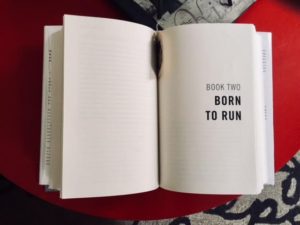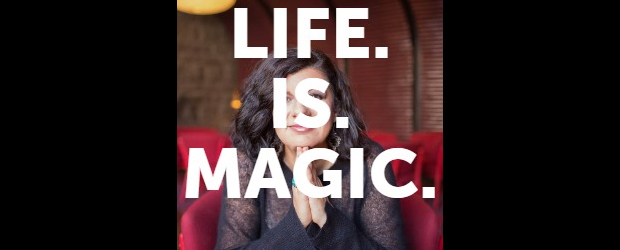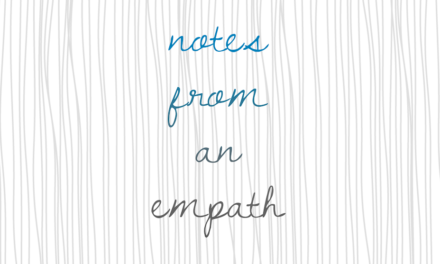
Then, boom, on page 312:
“The results of my work with Dr. Myers and my debt to him are at the heart of this book.”
****
Around the same time I published my first book, a memoir, this popular fellow Jersey native published his. It was late 2016 and I was in promo mode, not reading mode.
Then one recent day I was in the library looking for something else and there it was – Born To Run. To be frank, I went into it with low expectations. Another so-so celeb book? Still, I was intrigued.
Very quickly I realized I was wrong. And what a joyful comeuppance it was. This immediately became one of those rare books I can’t read fast enough yet don’t want to rush through because I don’t want it to end.
Push-pull. Hurry-slow down.
At points I was reading it from my ‘writer’ mindset and marveling at a poetic turn of phrase: “Here we live in the shadow of the steeple, where the holy rubber meets the road, all crookedly blessed in God’s mercy, in the heart-stopping, pants-dropping, race-riot-creating, oddball-hating, soul-shaking, love-and-fear-making, heartbreaking town of Freehold, New Jersey.”
Why was I so surprised that a man known for his storytelling could write? Perhaps because one form of writing doesn’t necessarily translate to another? I can’t imagine sitting down and writing a song, for instance. But for Springsteen, this felt like a seamless transition. I have mad respect for that.
At other times the book brought out my ‘life coach’ self, that part of me that always wants to find life’s big formulas to pass on to my clients. This story was filled with what so many success stories are — an extreme single-minded focus, a relentless pursuit of passion, a refusal to be swayed by any external force that let in a shade of doubt. The result was unquestionably magical, yet it is almost an insult to suggest magic played any part in Springsteen’s workmanlike rise.
But how might his story be helpful to my clients? One of the things that we do as coaches is encourage, shepherd, keep our clients accountable. However, we often have no gauge at all on whether they are talented enough to write the book they dream of or if their piano playing is good enough to take them beyond their living room. How do we know if they are capable of writing a song like Born To Run?
We don’t. That’s part of the beauty of the profession. That’s our job, to let them find out, see that they follow through, and learn what they’re made of as they uncover it for themselves.
Springsteen wasn’t stopped by poverty, naysayers telling him he had a lousy voice, bands that didn’t quite work, counting pennies to pay the toll to get into New York City, emotional demons, family issues, none of it.
When the time came that he recognized emotional patterns that frustrated him, he took a friend’s advice and sought help: “I get a number and two days later I drive fifteen minutes west to a residential home/office in a suburb of Los Angeles. I walk in; look into the eyes of a kindly, white-haired, mustached complete stranger; sit down; and burst into tears.”
The striving to get better, to be better, transcended what he did with a guitar. His dating life wasn’t working. He’d had a rough go with his father growing up. Just two of his observations in this regard go a long way in not only showing how hard he worked, but on how he’d felt a commitment to be scathingly honest in this book.
On his wedding day: “I’d let Patti know me like I’d never done with anyone else. This frightened me. I believed a lot of me wasn’t so nice to know. My self-centeredness, my narcissism, my isolation. Still, Patti tended to be a loner herself and this gave her a pretty good heads-up on how to handle me, but would she still love me if she really knew me?”
Among the “rough” lessons learned from his father that he had to overcome: “A misogyny grown from the fear of all the dangerous, beautiful, strong women in our lives crossed with the carrying of an underlying physical threat, a psychological bullying that is meant to frighten and communicate that the dark thing in you is barely restrained. You use it to intimidate those you love.”
I know firsthand how hard it is to publicly write those kinds of things, and I’m not famous. It’s an unmasking. This is even scarier for a guy like Springsteen than standing on a stage in Madison Square Garden. More mad respect that he went there.
Anyone who’s been in therapy knows there is a point where you’re heavily in blame mode, often angry at those from the past who you feel didn’t get it right. If you’re lucky, there is also a turning point where you pivot from that to improving yourself and your life. Bruce puts it like this:
“We honor our parents by not accepting as the final equation the most troubling characteristics of our relationship. I decided between my father and me that the sum of our troubles would not be the summation of our lives together. In analysis you work to turn the ghosts that haunt you into ancestors who accompany you. That takes hard work and a lot of love, but it’s the way we lessen the burdens our children have to carry.”
Pure gold.
****
Ultimately, the Boss writes that he tried “to show the readers his mind” in the pages of his book. He did that honorably.
People tell me I have done the same in mine and it makes me proud.
Here’s to the therapists who are good at what they do.




